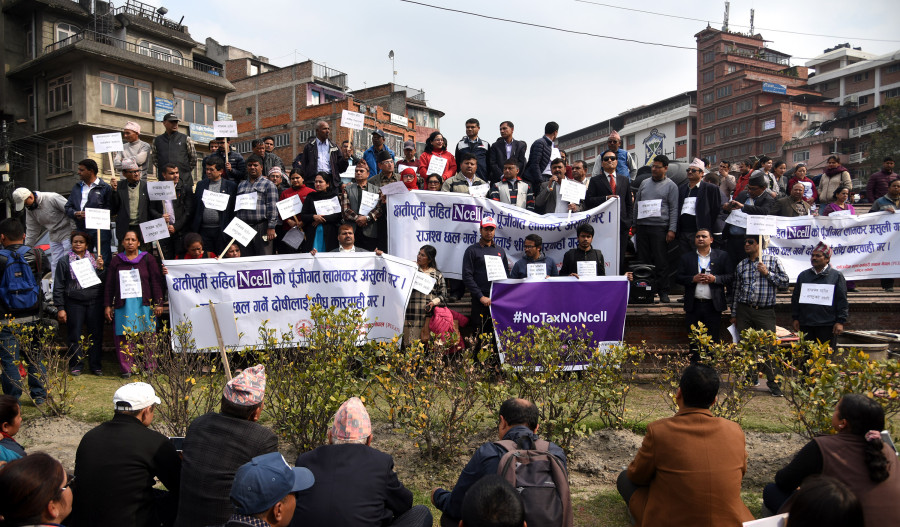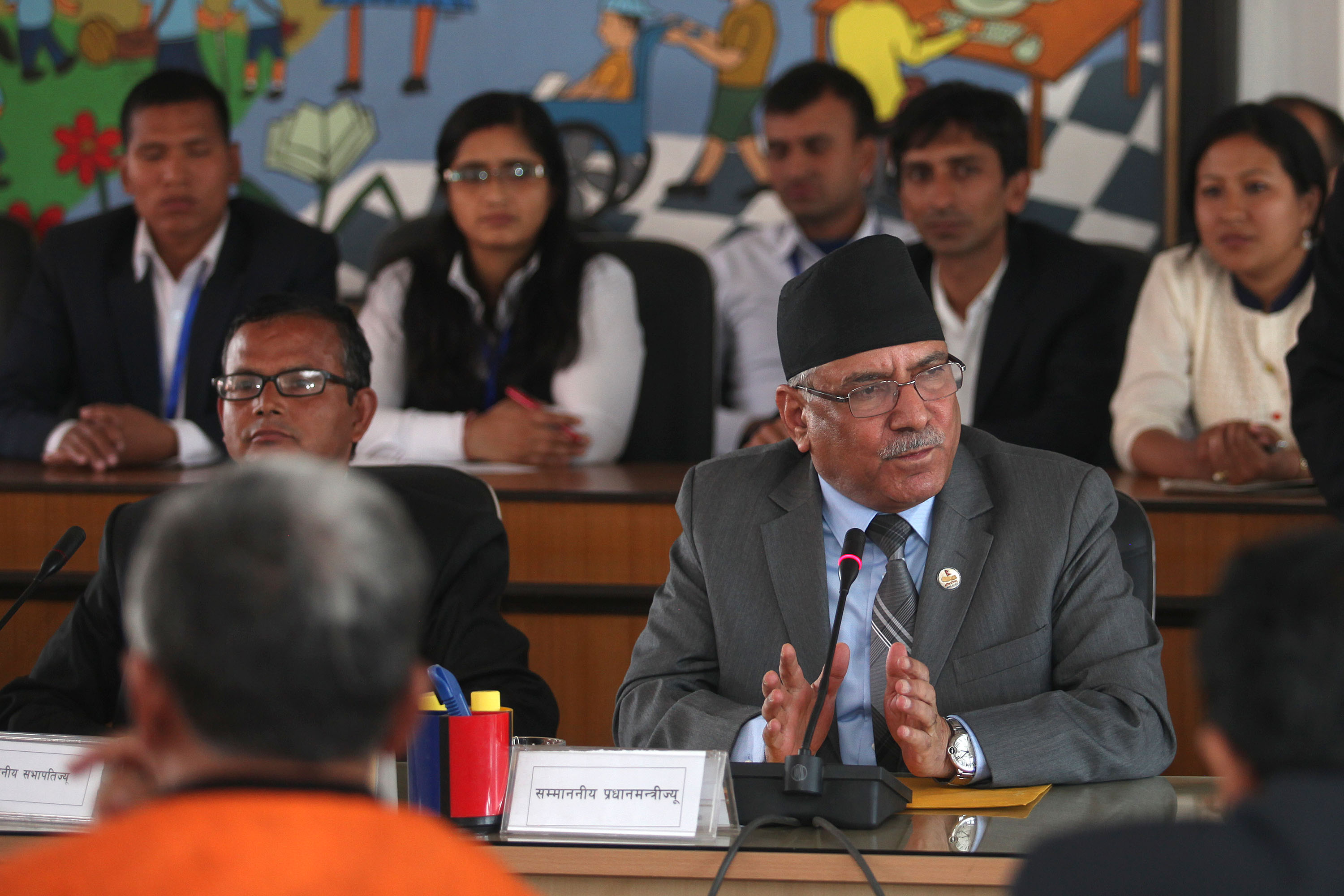Money
What Ncell tax dispute is all about
Confusions arose early on whether to tax the mega buyout deal. Campaigners later pressured government authorities and the court to recover the tax dues. Now an international tribunal has ruled in Ncell's favour as tax authorities didn't defend the case.
Prithvi Man Shrestha
Even after the Supreme Court gave its final verdict on the Ncell tax issue, telling the company last month to pay Rs21.1 billion, confusion continues to linger, as an international tribunal has issued a provisional order, saying the private sector mobile company does not need to pay the capital gains tax.
The question now being asked is whether the ruling of the International Centre for Settlement of Investment Disputes (ICSID), which came as per the request of the Ncell and Axiata (UK), prevails over domestic law and the Supreme Court verdict.
The Large Taxpayers’ Office has said it would collect the tax as per the Supreme Court verdict and has already written a follow-up letter to Ncell to pay Rs22.44 billion including fines after the company didn’t pay the amount during the initial deadline of December 19. But legal experts say it is not easy to deny the ruling of ICSID because Nepal is a party to the convention that established the tribunal.
Here’s everything you should know about the disputed deal and the efforts and counter-measures seen in the past four years over applicable taxes.
What is the dispute all about?
The issue began with the exit of Teliasonera, a Swedish-Norwegian company from Nepal, by selling all its 80 percent stake to the Malaysian company, Axiata, in April 2016 at Rs144 billion. The deal was done abroad as Axiata (UK) purchased the Reynolds Holding company, registered at Saint Kitts and Nevis, a tax haven, which is the owner of Ncell, from Teliasonera.
Long before the deal was done, there had been a debate whether it is taxable in Nepal. Teliasonera even asked the Inland Revenue Department whether the deal was taxable. But the tax authority remained undecided and failed to respond on time.
Instead, then director-general of the Inland Revenue Department told the Parliamentary Development Committee in January 2016 that Nepal has bilateral double taxation avoidance treaty with Norway, hinting that tax was not liable in the buyout.
On April 8, 2016, the parliamentary Finance Committee was called off abruptly following “political pressure from the highest level” to pave the way for the completion of the deal.
How did the feud fester?
Concerns on alleged tax evasion in the largest corporate deal in Nepal’s history didn’t die down. After the 54th annual report of the Office of the Auditor General, for the first time, said the deal was taxable in Nepal as per Clause 57 of the Income Tax Act and stated that the government needs to raise Rs32 billion as capital gains tax from the buyout deal worth Rs144 billion for 80 percent stake. This report reinforced the belief that the deal is taxable and encouraged an anti-Ncell campaign.
Sukdev Bhattarai Khatri, a former acting auditor general, told the Post in an interview a few months ago that several efforts were made from high level political and bureaucratic leaderships not to treat the Ncell deal as a case of tax evasion. "A government secretary and a joint-secretary had come to request not to show it as irregularities,” he told the Post.

How did the case land in court?
After retiring from the Auditor General’s Office, Khatri joined hands with other civil society members including former government secretaries Dwarikanath Dhungel and Jagadish Chandra Baral to file a writ at the Supreme Court in January 2018.
On February 6 this year, the Supreme Court gave the verdict that Ncell and its parent company Axiata are liable to pay tax after Ncell’s former owner, Teliasonera, exited Nepal without paying the capital gains tax, ending a long-drawn debate over whether the buyer should pay the tax when the seller does not meet its tax liability.
Based on this verdict, the Large Taxpayers’ Office had on April 16 determined the combined tax liability of Ncell and its parent company, Axiata, at Rs62.63 billion. Since the company had already paid Rs23.57 billion in capital gains tax, the tax office had ordered the private sector telecom giant to pay the remaining Rs39.06 billion within one week starting April 16.
What was Ncell’s response?
On April 22, Ncell moved the Supreme Court claiming that the tax office determined the tax amount without following the due process and its outstanding liability stood at just Rs14.36 billion. The same month, Ncell, along with Axiata (UK), which now owns Reynolds Holding, filed an application at ICSID, claiming that Nepal’s conduct in relation to capital gains tax imposed on the mobile company is against the Bilateral Investment Treaty between Nepal and the United Kingdom.
On August 26, the Supreme Court scrapped the tax determined by the Large Taxpayers’ Office for Ncell, questioning the authority’s tax determination process. In the full text of this verdict released on November 21, the Supreme Court said the private sector telecom company was required to pay only Rs 21.1 billion in outstanding tax.
On December 6, the Large Taxpayers’ Office determined capital gains tax at Rs 22.44 billion including fines and ordered Ncell to pay it by December 19. The company missed the deadline. ICSID on December 18 issued a provisional order staying the tax clearance process. On December 22, the Large Taxpayers’ Office wrote a follow-up letter to Ncell, asking it to clear the dues within 15 days.
What is the government’s take?
Jhalakram Adhikari, chief of Large Taxpayers’ Office, said ICSID deals with the investment issue and that tax issue comes under the jurisdiction of Nepal’s legal system. “The issue is tax, not investment as claimed by Ncell and its parent company when they moved the international dispute settlement body,” Adhikari told the Post. “We followed up as per existing laws and the Supreme Court verdict.” Making the same point, the government had not participated in the appointment of arbitrators at the ICSID tribunal. Axiata (UK) and Ncell, however, had appointed an arbitrator and managed to get a provisional ruling in the mobile company’s favour.
What do the experts say?
On December 20, Semanta Dahal, a corporate lawyer, wrote on Twitter: “ICSID convention is not itself clear about whether complying such interim order was a compulsion. But, past tribunals have made it mandatory to implement its order.” Another expert on international commercial law said investment in Ncell has an international character so Nepal cannot deny the application of international laws as it is party to relevant conventions. Both of them stressed the need for the government to present its case strongly at ICSID.
But Surendra Bhandari, a corporate lawyer and a campaigner against alleged tax evasion in Ncell deal, said he was not aware of how the issue became a matter of investment dispute. “I don’t think there is any legal provision or agreement between the Nepal government and Ncell on settling the tax issue through international arbitration,” he said.

Does defying ICSID order help Nepal?
Nepal is a signatory to the conventions for the establishments of both ICSID and the Multilateral Investment Guarantee Agency that guarantee protection of investments against non-commercial risks and can help investors obtain access to funding sources with improved financial terms and conditions.
According to Kumar Ingnam, a professor at the Kathmandu University School of Law who holds a doctorate degree in commercial international law, there is a ground for applying both domestic and international rulings in Ncell’s case.
But he suggested that ignoring the ICSID and its ruling could be counter-productive for Nepal, which has committed to protecting foreign investment to the international community by endorsing related conventions. “Right now, the ICSID ruling has come by examining the available evidence where the government has not produced enough evidence as it presented to Nepal’s Supreme Court,” said Ingnam. “The government has every opportunity to prove that it has the right to tax Ncell.”
He said that defying or ignoring the ICSID would only defame the country at the international arena. “What would the government do if ICSID gave its final decision in favour of Ncell?” he said.
Dahal, the corporate lawyer, agrees. Defying the ICSID order could send out a negative message about Nepal’s investment climate and discourage foreign investors. “We know about the problem with Ncell here but international investors don’t know all about it. They only see how the foreign investor was treated, going against international commitments,” he said.
Bhandari, however, questioned whether it is an issue that should have reached ICSID, as the government—a party to the dispute—did not seek arbitration.
Are campaigners satisfied with the latest court verdict?
After the Supreme Court reduced the tax amount, the campaigners who had filed a case of tax evasion in January 2018 attempted to file another writ at the top court to review its verdict. According to advocate Bhandari, the Supreme Court refused to register their writ on December 3. They again reached the court on December 8. After a hearing on December 24, the court upheld the registrar’s decision to not register the plea.
They were preparing to argue that the latest verdict of the court telling the tax authority not to fine the company as per Section 120 (A) of the Income Tax Act goes against the verdict delivered on February 6. “We had also claimed in the non-registered writ that Ncell should be fined 100 percent as per section 120 (B) of the Income Tax Act on the top of the outstanding capital gains tax liability,” Bhandari said.
Does the country need an amendment to the Income Tax Act?
Tax officials blamed the ‘unclear provision’ in the income tax law for the problems related to the Ncell capital gains tax. They say the tax should have been raised from Teliasonera before it exited Nepal. This had raised concerns about possible collusion between Teliasonera and politicians and government officials.
First the Auditor General’s Office and later the Supreme Court defined that the deal is taxable. This demands clarity in the country’s tax law even through amendments to address issues related to buyout deals of offshore companies that own Nepal-based companies.
For lawyer Bhandari, implementation of the existing Income Tax Act suffices as the Supreme Court has set precedents in such cases. But lawyer Dahal stressed the need for clear legal provisions regarding offshore deals. “There might be several interpretations of the court verdict,” said Dahal, calling for clear provisions on such deals in the Income Tax Act.




 21.12°C Kathmandu
21.12°C Kathmandu














